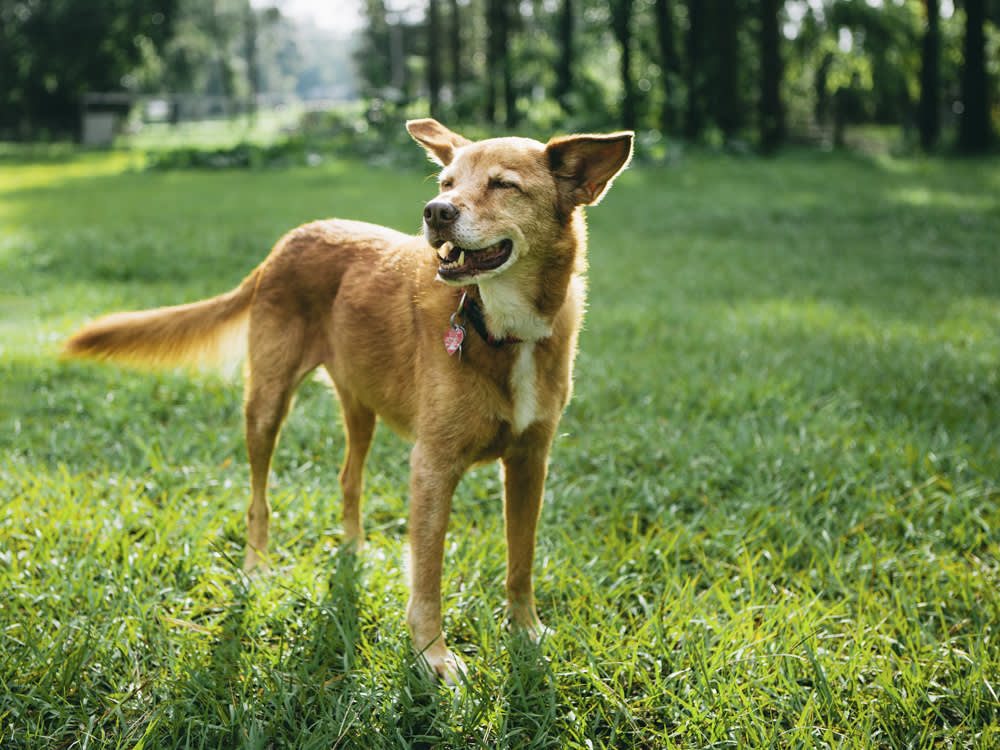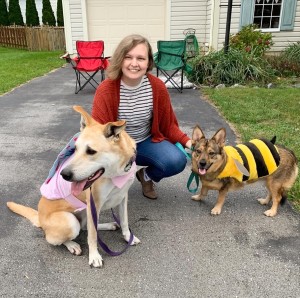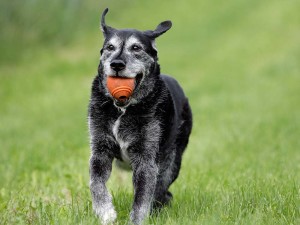Respiratory Illnesses in Dogs: 6 Serious Conditions Related to Coughing in Dogs
Vet advice on when you should be worried.

Share Article
In this Article:
Let’s just get it out there: For a dog, coughing, unlike sneezing, is never “normal.” As a small-animal veterinarian, I hear this all the time. Clients tell me that their dog has been coughing for a while off and on when they’re excited, after pulling on the leash, or while going to the groomer. They think the dog is “OK.” But a history of coughing always raises a red flag with me.
Coughing is caused by an irritation or inflammation of one or more of the dog’s respiratory organs. A problem anywhere in that system — the larynx, in the back of the throat; the windpipe; the airways (bronchi); or lungs — can cause your dog to cough. Heart disease, which is closely tied to the lungs and airways, also causes coughing.

Save on the litter with color-changing tech that helps you better care for your cat.
Sometimes, the cause of a dog coughing is benign, like a small bout of tracheobronchitis (an inflammation of the airways more commonly referred to as “kennel cough”) that resolves easily with medication and has a vaccine (bordetella). Sometimes, the cause is more worrisome; collapsing airways, pneumonia, a piece of grass or bone stuck in the back of the throat, parasites, laryngeal paralysis, or a cancerous tumor that is pushing on respiratory structures can all cause a dog to cough.
Learn all about why dogs cough and what symptoms to look out for in your pup, as well as when to consult your veterinarian.
Why is my dog coughing?
When coughing is due to a problem in the laryngeal area, it can be a real pain in the neck, both literally and figuratively. And new research is showing that more coughing dogs have laryngeal problems than previously thought.
“Some reasons a dog may be coughing include upper respiratory disease (CIRDC), primary lung disease such as bronchitis or cancer, collapsing trachea, or heart disease,” Dr. Tiffany Kay at Hickory Veterinary and Specialty Hospitalopens in new tab says.
The anatomy of a dog’s throat is much the same as that of a human’s. The larynx (the area between the nose and the trachea), trachea (windpipe), epiglottis (a flap of cartilage at the root of the tongue that is depressed during swallowing to cover the opening of the windpipe), and esophagus are the same in both. As well as housing the voice box, the larynx serves to protect the lower airways — trachea, bronchi, and lungs — from foreign material and germs. The larynx is lined with secretory membranes and comprises muscles, cartilage, and ligaments.
When should I take my dog to the vet for a cough?
Coughing isn’t normal for dogs, so don’t hesitate to take your dog to the vet if you’re concerned about their health. If you notice any of the following symptoms, visit your vet or an emergency clinic immediately:
Your dog’s gums are white, blue, purple, or red in color.
They’re breathing more than 40 breaths per minute while resting.
Your dog is sitting up with their neck extended or seems hesitant to lie down.
They cough up blood or phlegm that’s yellow or green in color.
The coughing is persistent and keeps your dog (and you) awake.
Your dog is eating or drinking less than usual.
“You should go to the vet if symptoms are severe, there is an increase in respiratory effort, symptoms last more than three to five days and are not improving on their own, or the dog is otherwise not feeling well and is not eating or lethargic,” Dr. Kay says. “Other symptoms that accompany a cough, such as vomiting, diarrhea, or lethargy, are concerning.”
Laryngitis
Like humans, dogs can develop laryngitis,opens in new tab an inflammation and swelling of the larynx secondary to infection, irritation by dust or smoke, inhaled foreign bodies (grass, bones), or trauma due to excessive barking or pulling against a collar. Older dogs can also develop laryngeal paralysis, a condition in which the muscles that move the arytenoid cartilages (a pair of pyramid-shaped pieces of cartilage that open and close during breathing) stop working.
Symptoms of laryngitis can often be mild, which can cause pet parents to miss them. The most common sign of laryngitis is coughing, particularly after any form of exertion or exercise. Other symptoms include:
Loud breathing (sometimes called “roaring”)
Excessive panting
Change in the sound of barking (known as dysphonia)
In more severe and sudden cases, dogs may develop respiratory distress, as well as bluish mucous membranes in the mouth; they may even collapse. In most cases, laryngitis develops as a result of an upper respiratory infection or irritation resulting from inhalation of smoke, dust, or foreign objects.
Kennel cough
Kennel cough is the more common name for canine infectious respiratory diseaseopens in new tab (CIRD), also known as bordetella. Caused by a bacteria or virusopens in new tab, kennel cough is most common in mid- to late-summer and is caused by an inflammation in the respiratory tract. Respiratory disease in dogs spreads quickly in areas where dogs are close together, like kennels, hence the name “kennel cough.”
Symptoms of kennel cough include:
A persistent dry cough
Retching
A cough that grows worse after exercise or exertion
Kennel cough is rarely severe and often goes away on its own. If your dog has a persistent case, your veterinarian can prescribe medicationsopens in new tab to help your pup recover more quickly and keep the illness from growing worse. Fortunately, you can also have your dog vaccinated against Bordetellaopens in new tab, which can help reduce the chances of contracting kennel cough.
Tracheal collapse
Tracheal collapse is a severe condition that occurs most commonly in toy and miniature dog breeds, although occasionally in larger breeds too. The root cause of tracheal collapse is unknown, but it tends to happen more frequently in obese dogs and those with heart disease or other respiratory conditionsopens in new tab.
Symptoms of tracheal collapse include:
Dry, honking cough that is persistent
Labored breathing
Difficulty breathing
Weight loss and reduced exertion or stress can help reduce symptoms, along with the use of medications such as cough suppressants, antibiotics, and corticosteroids. In more severe cases, your vet may recommend surgeryopens in new tab and the placement of a stent. opens in new tab
Rhinitis
One of the most common upper respiratory tract infections in dogs is rhinitisopens in new tab, which is an inflammation of the mucous membranes in the nose. Rhinitis often goes along with sinusitis (inflamed sinus linings) and is usually caused by a viral infection.
Symptoms of rhinitis include:
Nasal discharge
Sneezing
Snoring
Open-mouth or labored breathing
Rhinitis, like other mild respiratory infections, often goes away on its own, but if symptoms worsen or appear chronicopens in new tab, contact your veterinarianopens in new tab.
Pneumonia
Pneumonia is a relatively commonopens in new tab infection of the lungs caused by inflammation of the alveoli (sacs in the lungs). Many triggers can cause pneumoniaopens in new tab, including allergens, bacteria, viruses, fluids, or foreign bodies.
Symptoms of pneumonia include:
High fever
Difficulty breathing
Easily tired after exercise or exertion
Lethargy
Nasal discharge
Lack of appetite and weight loss
Dehydration
Pneumonia can be treated with antibiotics, so contact your vet immediatelyopens in new tab if you suspect that your dog has developed pneumonia. In more severe cases, your vet may suggest treatment with fluid therapy, chest percussion, oxygen therapy, and/or intravenous fluids.
When to consult a vet
If your dog’s symptoms persist or worsen, consult a veterinarian immediately. Pay attention to any changes in your dog’s behavior, and if your pet seems to be in pain or having trouble breathing, don’t hesitate to visit the vet as soon as possible.
References
Beal, Matthew W. “Tracheal Stent Placement for the Emergency Management of Tracheal Collapse in Dogs.” Topics in Companion Animal Medicine, vol. 28, no. 3, Aug. 2013, pp. 106-11. https://www.sciencedirect.com/science/article/abs/pii/S1938973613000512opens in new tab.
Cook, W.R. “Observations on the Upper Respiratory Tract of the Dog and Cat.” Journal of Small Animal Practice, vol. 5, no.4, Aug. 1964, pp. 309-29. https://doi.org/10.1111/j.1748-5827.1964.tb04259.xopens in new tab.
Danesi, Patrizia, et al. “Molecular Diagnosis of Pneumocystis Pneumonia in Dogs.” Medical Mycology, vol. 55, no. 8, 23 Feb. 2017, pp. 828-842, academic.oup/com/mmy/article/55/8/828/3048647, https://doi.org/10.1093/mmy/myx007opens in new tab.
Dear, Jonathan D. “Bacterial Pneumonia in Dogs and Cats.” Veterinary Clinics of North America Small Animal Practice, vol. 44, no. 1, Nov. 2013, pp. 143-59, https://doi.org/10.1016/j.cvsn.2013.09.003opens in new tab.
Europe PMC. Europe PMC. europepmc.org/article/med/207006opens in new tab.
Johnson, L.R., and R.E. Pollard. “Tracheal Collapse and Bronchomalacia in Dogs: 58 Cases (7/2001-1/2008).” Journal of Veterinary Internal Medicine, vol. 24, no. 2, Dec. 2009, pp. 298-305. https://doi.org/10.1111/j.1939-1676.2009.0451.xopens in new tab.
Kogan, David A., et al. “Etiology and Clinical Outcome in Dogs With Aspiration Pneumonia: 88 Cases (2004-2006).” Journal of the American Veterinary Medical Association, vol. 233, no. 11, Dec. 2008, pp. 1748-55. https://doi.org/10.2460/javma.233.11.1748opens in new tab.
Laryngeal Diseases, download.skyscape.com/download/ota/5mvetcf5/documents/pdf/laryngeal_diseases.pdfopens in new tab.
Lux, Cassie N., et al. “Gastroesophageal Reflux and Laryngeal Dysfunction in a Dog.” Journal of the American Veterinary Medical Association, vol. 240, no. 9, May 2021, pp. 1100-1103, https://doi.org/10.2460/javma.240.9.1100opens in new tab.
Thrusfield et al, “A Field Investigation of Kennel Cough: Efficacy of Vaccination.” Journal of Small Animal Practice, vol. 30, no. 10, Oct. 1989, pp. 550-60, https://doi.org/10.1111/j.1748-5827.1989.tb01471.xopens in new tab.
Thrusfield, M.V., et al. “A Field Investigation of Kennel Cough: Efficacy of Different Treatments.” Journal of Small Animal Practice, vol. 32, no. 9, Sept. 1991, pp. 455-59, https://doi.org/10.1111/j.1748-5827.1991.tb00987.xopens in new tab.
Van Pelt, Deborah R., and Brendan C. McKiernan. “Pathogenesis and Treatment of Canine Rhinitis.” Veterinary Clinics of North America: Small Animal Practice, vol. 24, no. 5, Sept. 1994, pp. 789-806, https://doi.org/10.1016/s0195-5616(94)50101-3opens in new tab.
White, R.a.S., and J.M. Williams. “Tracheal Collapse in the Dog - Is there Really a Role for Surgery? A Survey of 100 Cases.” Journal of Small Animal Practice, vol. 35, no. 4, Apr. 1994, pp. 191-96. https://doi.org/10.1111/j.1748-5827.1994.tb01685.xopens in new tab.
Windsor, Rebecca C., and Lynelle R. Johnson. “Canine Chronic Inflammatory Rhinitis.” Clinical Techniques in Small Animal Practice, vol. 21, no. 2, May 2006, pp. 76-81, https://doi.org/10.1053/j.ctsap.2005.12.014opens in new tab.
Windsor, Rebecca C., et al. “Idiopathic Lymphoplasmacytic Rhinitis in Dogs: 37 Cases (1997-2002).” Journal of the American Veterinary Medical Association, vol. 224, no. 12, June 2004, pp. 1952-53. https://doi.org/10.2460/javma.2004.224.1952opens in new tab.

Sarah Wooten, DVM
Sarah Wooten is a small animal veterinarian and certified veterinary journalist. She practices in Greeley part time at Sheep Draw Veterinary Hospital, and writes for multiple online and print publications.

Savannah Admire
Savannah Admire is a writer, poet, and pet mom to three dogs and a cat. She currently lives in Western Maryland. When she’s not writing, you can find her reading, taking photos, or volunteering as a content creator for her local community theatre. Her debut poetry book, Mother Viper, is due out August 12, 2025, and you can follow her on Instagram at @savannahcooperpoetopens in new tab.

